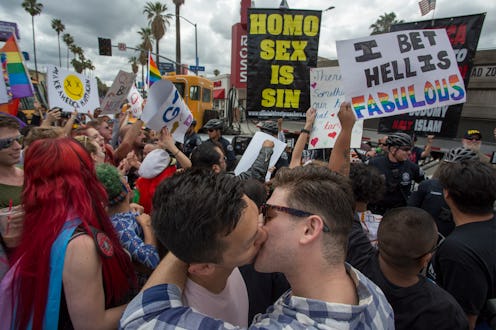News
These Mormons Are Pushing LGBTQ Pride, One Hug At A Time

In the last decade, Mormons and the LGBTQ community have had major instances of tension. After all, Mormons provided key support for California's Proposition 8, the 2008 measure which outlawed same-sex marriage in the state. Then there's the recent story of church leaders silencing a young girl in Utah when she tried to come out went viral. But there is a growing group of Mormons who want to bridge the gap between their faith and LGBTQ activism — specifically, through hugs.
It is no secret there are LGBTQ people who still identify as Mormons and believe in the Church of Latter Day Saints, and there are Mormon church members who support LGBTQ rights and expression. "I've always been interested in juxtaposition and defying simplistic ideas, challenging binaries," Erika Munson, who co-founded the group Mormons Building Bridges in 2012, tells Bustle. In an effort to bring LGBTQ activism to the Mormon community, she started organizing a group of Mormons to go to pride parades, express support, give hugs and sometimes apologies, and most importantly, spark conversation between two fractured demographics.
Munson says she attended her first Pride parade in 2012. "I'd never been in a gay pride parade, so I signed up to march in Utah, hoping to gather 25 friends to march with me as committed Mormons showing unconditional love and support to our LGBTQ friends." She describes how she and other Mormons showed up to the Salt Lake City Pride parade in their church clothes with scriptures to show there was a church presence supporting the LGBTQ community. "I thought it was going to be a one-off thing, but I realized there's so much reason to reach out," she says.
Following the parade in 2012, Mormons Building Bridges began looking for ways to create a space for conversation between the two communities, particularly LGBTQ Mormons: "People need a place to talk about ... [and show] support for all sexual orientation and gender identities," she says.
We have hugging booths at Pride festivals where we offer hugs and conversation about this dissonance between the church and LGBTQ community. It can be tricky. But we're trying to be church affirming and LGBT affirming, and that's a difficult and interesting road to travel.
While the Mormon church opposes same-sex marriage in their official theology, for Munson, and many like her, keeping her faith means something different. "This is what Jesus taught," she says. "He was concerned about church hierarchy forgetting the greater commandment of loving your neighbor."
The presence of active Mormon LGBTQ groups hasn't just been a product of the last few years. John Gustav-Wrathall, a member of the International Leadership Team and former president of Affirmation, a LGBTQ supportive Mormon organization, tells Bustle their organization has been around since the 1970s.
We started in 1977 with some BYU (the flagship Mormon university) students who found each other and started to meet. These were individuals who were trying to make sense of being gay, and acknowledging their experiences as gay and lesbian people. There just didn't seem to be any logical place for that in the context of Mormonism. The assumption of the founders was: There has to be a place for us in the context of LDS Faith.
While Affirmation has been around for decades, serving as a space to discuss Mormon theology, LGBTQ issues, and the combination of both, Gustav-Wrathal shares that they've seen huge growth in recent few years.
"Since 2012, the attendance at our conferences was quadrupled. We have a website with tens of thousands of people from all over the world," says Gustav-Wrathal. "So there's been this huge growth. I think it's all been driven by this rising tide of discussion in and out of the church around LGBTQ issues."
Gustav-Wrathal tells Bustle that Proposition 8 caused huge division in the Mormon church, and it both directly and indirectly lead to the growth of Affirmation.
"There was a lot of pain and trauma, particularly in congregations in California, in churches that were trying to pass Prop 8 and becoming strident in their efforts to stifle gay rights," says Gustav-Wrathal. "Then there were members of these congregations who were LGBTQ and in the closet, and this heightened rhetoric was causing tremendous pain. There was a reaction, people started coming out and talking about their family members or themselves."
Despite the tension, there have been many cases in which the increased conversation has brought a change of perspective.
"We had a guy who reached out to us a few years ago. He literally sent us an email that said something to the effect of, 'I was a supporter of Prop 8 and I said and did things that I just didn't understand. I feel terrible, and I want to do something to help,'" Gustav-Wrathal recalls. "Then he offered us a substantial, I think $15,000, to help us."
While Gustav-Wrathal acknowledges that there is still a long road ahead for LGBTQ activism in the Mormon community, he has seen such large strides in recent years, that he has hope.
"The grassroots Mormon people are much more understanding than they were 10 or 20 years ago. That's certainly reassuring," he says. "I think there is an element of faith, that God can move things forward in the church and eventually church leaders will be able to receive a new understanding."